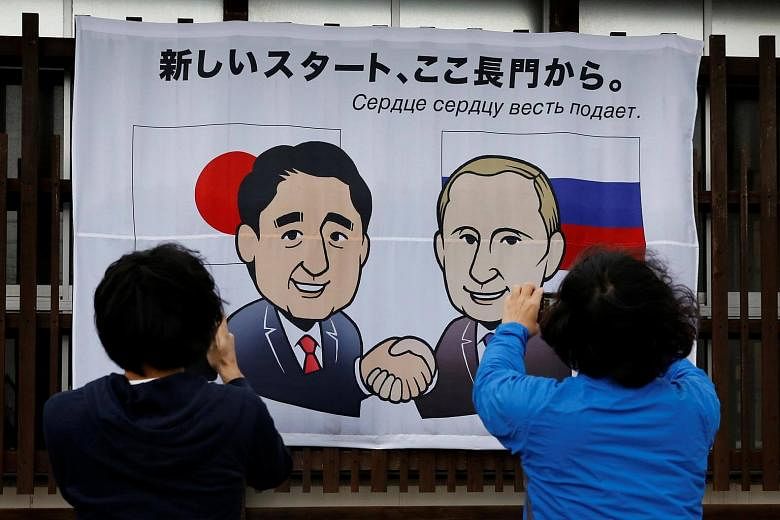Weeks before Russian President Vladimir Putin was to visit Japan for the first time in a decade, Moscow deployed coastal defence missiles on disputed islands north of Hokkaido.
This manoeuvre was a strong signal that a breakthrough in the island spat between the two nations is unlikely during Mr Putin's two- day visit to Japan starting today.
The dispute over the sovereignty of the islands has been an obstacle to the signing of a peace treaty since the end of World War II.
Dr James Brown, a Russia expert at Temple University in Tokyo, told The Straits Times that while the Russian deployment has been planned for some time, there is symbolism in the fact that this was not delayed until after the summit.
"It is a message from Russia that they don't yet regard Japan as a particularly close partner," he said. A peace treaty will formally end World War II hostilities between the two countries, and the leaders see it as important in building a forward-looking relationship.
How the two countries can finally move forward on the peace deal will likely be on the agenda when Japanese Prime Minister Shinzo Abe hosts Mr Putin to "ryokan diplomacy" today.
The two leaders will meet in Mr Abe's home town of Nagato City in Yamaguchi prefecture, western Japan, 1,000km away from the capital. They will also meet for formal talks in Tokyo tomorrow.
Japan claims the four islands, known as the Northern Territories in Japan and the Southern Kurils in Russia, which Russia seized control of in 1945 in the last days of the war.
While Moscow has offered the return of the two smaller islands, Tokyo has refused because they comprise only 7 per cent of the overall land area. The other two islands are also more resource-rich. Moscow has also been peeved by Tokyo's reluctance to commit to not allowing United States bases on the islands if they were returned.
Mr Abe and Mr Putin have held 15 bilateral summit meetings so far, with the most recent in Lima last month. But unlike his palpable optimism in Sochi in May, when Mr Abe said he felt a "positive response", he said last month that an agreement was "not going to be easy".
Mr Putin has said Moscow wants "full normalisation" of its ties with Tokyo, and that Russia "does not trade in territories". He also told the Japanese media this week that the absence of a peace treaty is an "anachronism" that should be eliminated, adding: "But how to do this is a difficult question."
Japan is trying to win concessions by promising investments in Russia, which has been mired in an economic crisis. But Japan is also part of the Group of Seven advanced economies that have imposed heavy sanctions on Russia for its annexation of Crimea in 2014, and its counterparts are concerned that Japan is breaking ranks.
Further impeding progress is Moscow's arrest of its Economic Development Minister Alexei Ulyukayev, who was in charge of economic talks with Japan, on an unrelated corruption charge last month.
Dr Nobuo Shimotomai of Hosei University Graduate School of Politics noted these issues would cast a pall over the talks. "The formula of Russo-Japanese talks might focus on joint economic activities, but the heart of the negotiations goes back to the territorial dispute," he said.
But the US election of Mr Donald Trump, who is said to be warm towards Russia, could potentially shift the leaders' calculations. Dr Brown said: "For Japan to build closer economic and security ties with Russia, the election of Mr Trump makes that more possible."

